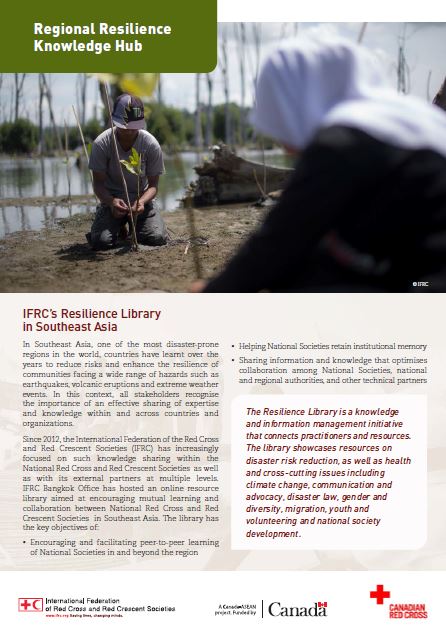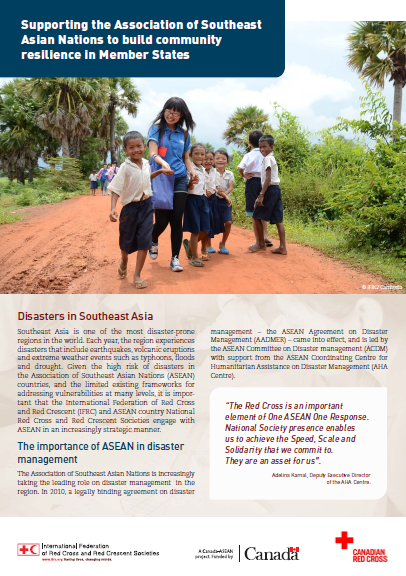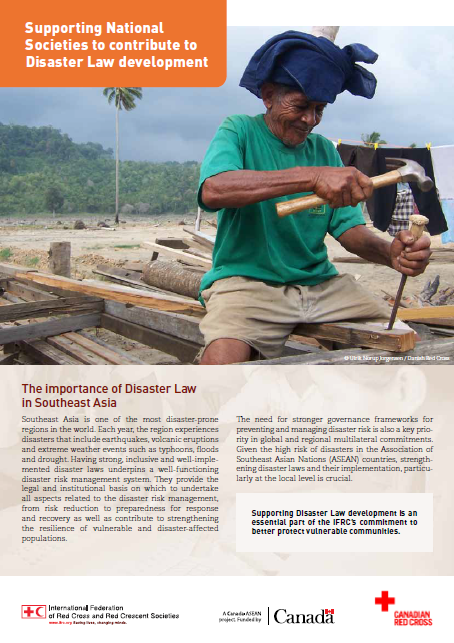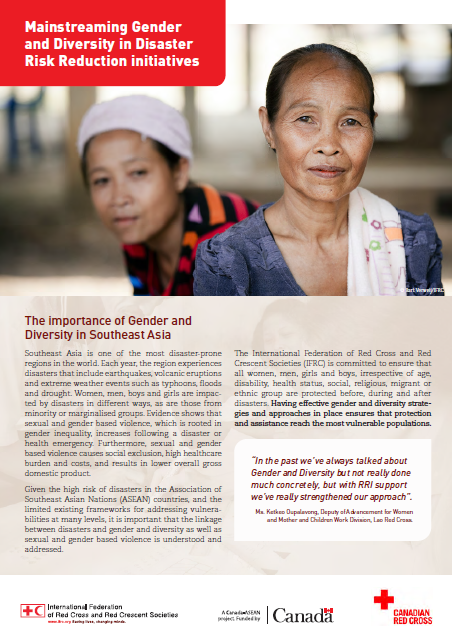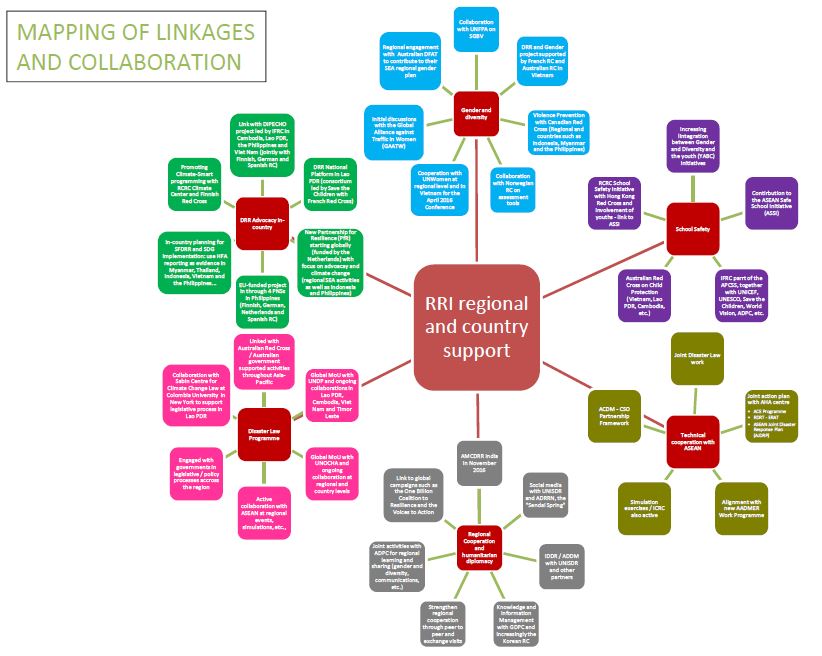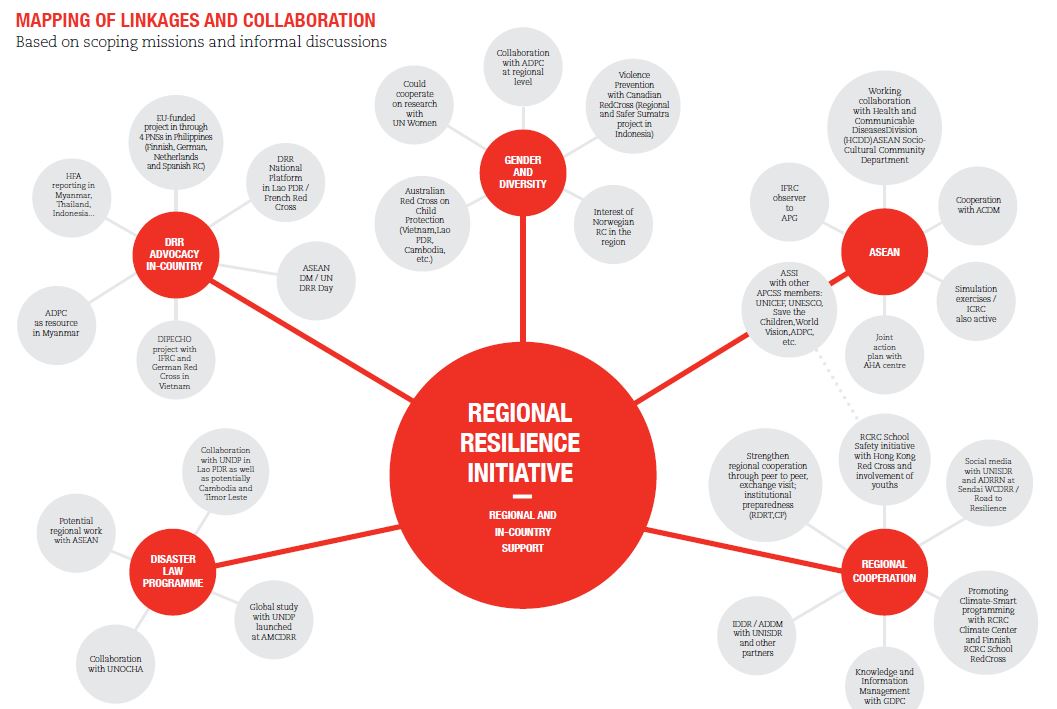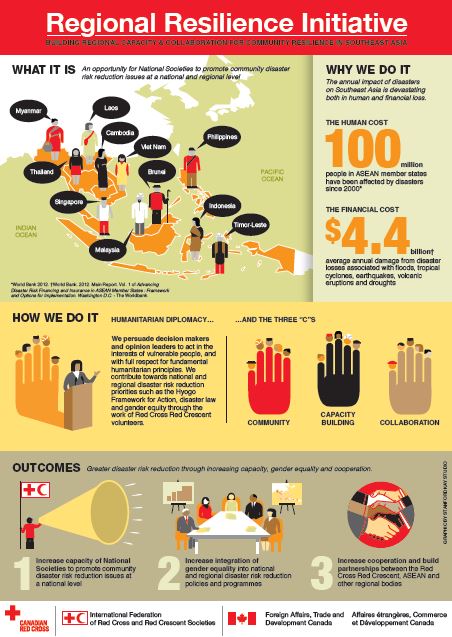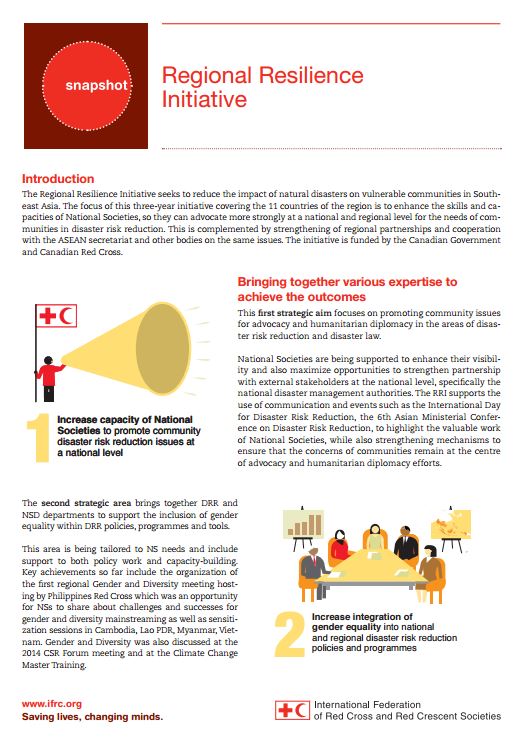Case Study: Regional Resilience Knowledge Hub
Purpose
This four-page case study describes IFRC’s works on this resilience library, a visionary and wide-ranging resource hub which aims to encourage mutual learning and collaboration between National Red Cross and Red Crescent Societies in Southeast Asia. It describes about the features and how the resilience library contributes as the knowledge sharing platform in this region.
Overview: the case study discusses the IFRC Southeast Asia Resilience Library on the aspect of (being):
- A visionary, popular and wide-ranging resource hub
- A wide-ranging resource hub for multiple users
- Towards the future
Usage: Learning from experience
Audience
- Red Cross Red Crescent stakeholders
- Key external stakeholders and partners, such as governments, ASEAN, donors and technical stakeholders
![]()
Case Study: Supporting the Association of Southeast Asian Nations to build community resilience in Member States
Purpose
This four-page case study describes IFRC’s works to support the Association of Southeast Asian Nations (ASEAN) to build community resilience. It highlights the importance of ASEAN in disaster management and key component of IFRC/s work at the national and regional levels. It also discusses IFRC’s support to the implementation of the ASEAN Agreement on Disaster Management (AADMER) Work Plan and the way forward to implement the work in the region.
Overview
– The importance of ASEAN in disaster management
– IFRC and ASEAN – a strategic partnership
– The unique contribution of Red Cross Red Crescent Societies
– IFRC’s support to the implementation of the AADMER Work Plan
– Celebrating success with ASEAN
Usage: Learning from experience
Audience
1. Red Cross Red Crescent Societies’ stakeholders
2. Key external stakeholders and partners, such as governments, ASEAN, donors and technical stakeholders
Case Study: Supporting National Societies to Contribute to Disaster Law Development
Purpose
This four-page case study describes IFRC’s works on disaster law development in South-East Asia, with the highlight focused in the progress in Indonesia and Lao PDR. It also discusses an inclusion of gender and diversity issue in the country’s disaster law draft and the way forward to implement the work in region.
Overview
– The importance of Disaster Law in Southeast Asia
– Disaster Law in the International Federation of Red Cross and Red Crescent Societies
– Improving disaster law in Indonesia and Lao PDR
– Inclusion of gender and diversity in disaster law
– Key achievements from the Regional Resilience Initiative (RRI), a four-year initiative supported by Canada
Usage: Learning from experience
Audience
1. Red Cross Red Crescent stakeholders
2. Key external stakeholders and partners, such as governments, ASEAN, donors and technical stakeholders
Case Study: Mainstreaming Gender and Diversity in Disaster Risk Reduction Initiatives
Purpose
This four-page case study launched on the occasion of the International Women’s Day on 8 March 2017 showcases the importance of Gender and Diversity mainstreaming within Disaster Risk Reduction policies, strategies and programmes, with a focus on Southeast Asian countries.
Overview
- IFRC’s approaches on Gender and Diversity
- The South East Asia Regional Gender and Diversity Network
- Gender and Diversity and Disaster Law
- Key achievements from the Regional Resilience Initiative (RRI), a four-year initiative supported by Canada
Usage: Learning from experience
Audience
- Red Cross Red Crescent stakeholders
- Key external stakeholders and partners, such as governments, ASEAN, donors and technical stakeholders
![]()
Steering Committee Meeting for Regional Resilience Initiative | 26 April 2016 | Bangkok, Thailand
The annual Steering Committee Meeting for the Regional Resilience Initiative (RRI) was held in Bangkok on 26 April 2016. The objective of the meeting was to review the second year of implementation of the initiative and to discuss among partners the proposed Work Plan for the third year of the project. | See agenda and participant list.
As per the initiative agreement, the roles and responsibilities are :
Project Steering Committee: The project is directed by a Project Steering Committee comprising the Canadian Government representative (from Global Affairs Canada), Canadian Red Cross Senior Manager for Asia Programs, the IFRC Head of Bangkok Country Cluster Support Team, the Southeast Asia National Societies’ Community Safety and Resilience Forum’s (CSRF) representative. It meets annually to oversee the project’s strategy, provide overall guidance, approve annual work plan and budget, facilitate learning, and ensure coherence with participating agencies’ objectives. A participatory annual planning process involving key stakeholders informs annual plans and budgets.
The meeting welcomed the progress made with the implementation of the initiative across the areas of support and the targeted countries. The meeting further agreed to strengthen the monitoring and evaluation of the plans as well as to deepen the linkages with the ASEAN Secretariat. See the full minute of the meeting.
Below are presentations delivered during the meeting:
- Overview of project achievements from annual work plan year 2 – April 2015 to March 2016
- Overview of the third annual work plan year 3 – April 2016 to March 2017
- Canadian Red Cross in Asia
The meeting approved the below four technical Work Plans covering the period April 2016 to March 2017:
- Humanitarian Diplomacy and Communications
- Disaster Law
- Gender and Diversity
- Community Safety and Resilience
The documents were produced based on the in-country plans received from 9 National Societies in Southeast Asia as well as technical dialogue between related IFRC and National Societies’ focal points. They are contributing to the IFRC Bangkok Country Cluster Support Team 2016 Operational Plan [link to FedNet].
About Regional Resilience Initiative (RRI)
For more info, see the page on the recent RRI retreat.
![]()


